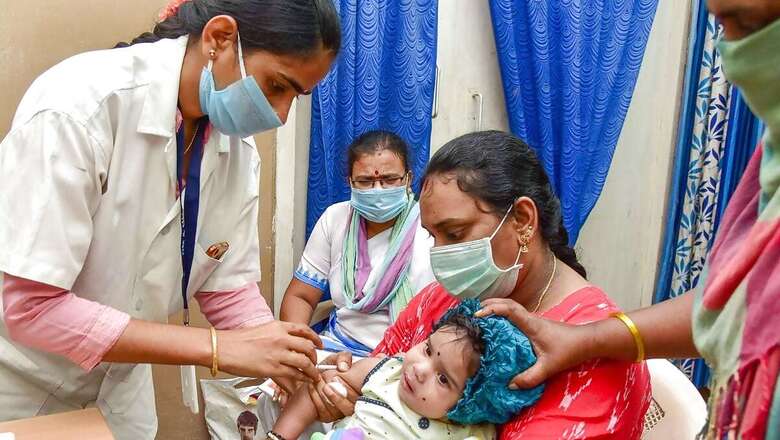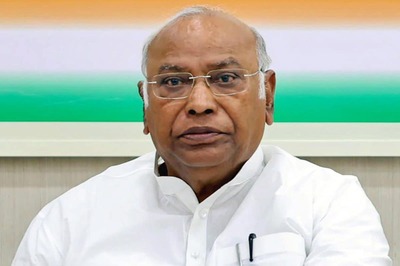
views
It is now well established that the Covid-19 pandemic disrupted essential health services across the world. The World Health Organization has been tracking these disruptions through surveys in select countries. Its global pulse survey on continuity of essential health services during the pandemic reported that disruptions in routine outreach and facility-based immunisation services was nearly 50 percent each.
Immunisation is a key child health programme, protecting children from serious diseases and even death. The Regions of the Americas became the first in the world to be certified polio-free by WHO in 1994; hence, a report of paralytic polio in an unvaccinated adult in Rockland County, New York state, in September 2022 was a significant setback.
How well did India’s immunisation programme cope?
India’s immunisation programme is among the largest in the world, vaccinating about 26.7 million infants and 30 million pregnant women annually. The logistics include 29,000 cold chain points, 240 walk-in coolers, 70 walk-in freezers, 45,000 ice-lined refrigerators, 41,000 deep freezers and 300 solar refrigerators. This infrastructure was a key pillar in mounting the Covid-19 vaccination programme.
The National Family Health Survey (NFHS-5), 2019-21, collected information of children aged under five between June 2019 and April 2021. An analysis interpreted that children experienced lower routine immunisation coverage and greater delays during the pandemic, and that those from rural areas experienced the highest reduction in vaccine coverage.
An estimated three million children missed DPT (diphtheria, pertussis and tetanus) doses in 2020; this translated to a reduction of 6 percent against 2019 levels. India experienced several large outbreaks of measles, including deaths, but an accelerated response was able to contain it fairly rapidly.
Containing the backslide: riding on sustained all-round strengthening
Significantly, despite the backslide in immunisation in the first year of the pandemic, India was able to halt it in the second year despite the savage Delta wave. There were an estimated three million children with zero doses (unreached or missed out) between 2020 and 2021; it reduced to 2.7 million in the next year, a relatively smaller proportion given that this is the world’s largest birth cohort.
This was quite in contrast to the global picture as is now emerging. The Indian strategic thinking is instructive. India declared immunisation as an essential service in April 2020 and followed it up with a set of detailed inputs and standard operating procedures.
It was important to organise and ensure safe vaccination during pandemic restrictions, and guidelines were issued accordingly. Ongoing micro-plans were modified to identify vaccination sites, including in outreach settings, beyond Covid-19 restricted areas. Logistical arrangements were organised to prevent virus transmission at session sites.
Regular reviews were conducted by national, state and district level managers. Based on the analyses of ground situations, modifications were made at frontline settings to respond to the evolving pandemic on a continuous basis.
Periodic intensification of routine immunisation (PIRI) is a spectrum of time-limited, intermittent catch-up activities or campaigns to administer routine vaccinations to under-vaccinated populations. India’s Intensified Mission Indradhanush (IMI) is an adaptation of the PIRI; launched in 2014, it has contributed to significantly increasing fully immunised children.
At least 250 high-risk districts and 152 medium-risk districts (with coverage improvement plans) benefited from the IMI 3.0 conducted during February-March 2021. Three rounds of IMI 4.0 were undertaken in 416 districts, identified based on vaccination coverage of NFHS-5, health management information system (HMIS) data and burden of vaccine preventable diseases.
In view of the Delta wave, the states were given the option to conduct the operation either during February-April 2022 or March-May 2022. Several states organised additional catch-up campaigns too. The strengthening of electronic and digital arms of the programme also contributed in no small measure.
The Electronic Vaccine Intelligence Network (eVIN) has digitised vaccine stock management, logistics and temperature tracking at all levels of vaccine storage; it was operational in 32 states and union territories when the pandemic set in. The national cold chain management information system (NCCMIS) is a tool for planning and taking management decisions based on real-time information of cold chain equipment status.
The global endorsement
The State of the World’s Children (SOWC) 2023 by UNICEF is a report that examined the impact of the pandemic on national immunisation programmes across the globe and concluded that the world is “facing a red alert for children’s health”. Between 2019 and 2021, 67 million children missed their scheduled vaccines, fully or partially.
Consequently, resurgence of measles and polio outbreaks are on the rise as progress made over the last decade was set back to 2008 levels. Based on a recent report of the Vaccine Confidence Project (VCP), it is now known that perceptions towards the importance of vaccines for children have significantly declined since the pandemic in 46 of 55 countries studied.
Agreement that vaccines are important for children increased in only three countries; India registered a 3.9 percent increase between pre- and post-pandemic cohorts, as did China and Mexico. India also registered a 6.7 percent increase in agreement that vaccines are important for children. India is consistently ranking among countries with high vaccine confidence, and this was found to be true for Covid-19 vaccination as well.
Responding to the global crisis, the WHO’s theme for the World Immunisation Week 2023 (April 24 to 30) was ‘The Big Catch-up’: to catch-up on children who missed their routine immunisation during the pandemic and restore essential immunisation coverage to at least 2019 levels.
While India has done well to contain the backslide during 2021, there is still a lot to catch up on missed doses. India also needs to remain alert on maintaining the polio-free status and be able to meet the measles rubella elimination targets.
(Rajib Dasgupta is professor at the Centre of Social Medicine and Community Health, Jawaharlal Nehru University, New Delhi, and editor of the Indian Journal of Public Health)
Read all the Latest Opinions here




















Comments
0 comment